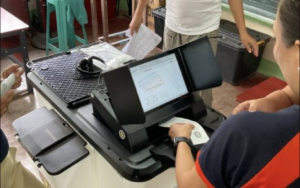Please allow us to set the record straight regarding some points raised by former Associate Justice Antonio T. Carpio in his Inquirer column, “Are CPP-NPA rebels terrorists?” (7/16/20), where he said Sen. Panfilo M. Lacson, along with President Duterte, are “sadly mistaken” with regard to the Communist Party of the Philippines-New People’s Army (CPP-NPA) as terrorists.
In his column, former Justice Carpio also claims proscription means the designation of a group or association as engaged in the crime of terrorism.
Senator Lacson has repeatedly explained that the President’s statement referred to the designation of the CPP-NPA as a terrorist group by the Anti-Terrorism Council in late 2017 as authorized by Section 11 of Republic Act No. 10168, the Terrorist Financing Prevention and Suppression Act of 2012.
This designation, which complies with the standards set by the United Nations Security Council Resolution 1373, paved the way for the filing of a proscription case by the Department of Justice (DOJ). The proscription case is now pending before the Manila Regional Trial Court.
RA 11479, the Anti-Terrorism Act of 2020, includes a restatement of Sec. 11 of RA 10168, with the addition of the mechanism needed for the freezing of assets by the Anti-Money Laundering Council.
Thus, there is nothing illegal in the action by the Chief Executive to proclaim that the CPP-NPA is a designated terrorist organization after the Anti-Terrorism Council (ATC) has ruled on the matter.
It is unfortunate that former Justice Carpio seems to still miss the difference between designation and proscription. Designation is an administrative act that can be exercised by the executive branch through the ATC; proscription is judicial which only the courts—the Court of Appeals under the Anti-Terrorism Act of 2020—can decide, with the burden of proof with the DOJ.
A similar due process of law applies even to membership of a proscribed terrorist organization, where the Court of Appeals will decide who may be identified as members and subsequently arrested.
We hope former Justice Carpio is not among those who interchange the terms designation and proscription to claim that mere designation may result in arrest and detention, thus giving the ATC judicial powers under RA 11479—which is wrong, if not malicious.
As to former Justice Carpio’s claim that the NPA cannot be considered terrorists, it is up to the Manila Regional Trial Court—or the Court of Appeals—to decide on the proscription case before it.
We hope this clarifies the issue. Thank you.
Joel Locsin,
media relations officer,
Office of Sen. Panfilo M. Lacson


